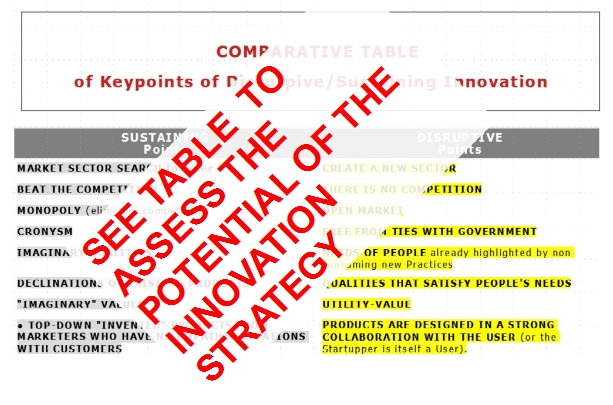
Most of the considerations on the near future of Business are wrong because they are based on a “linear” conception of the evolution of the Market that is not able to perceive what the real changes are taking place.
Radical changes are not an option: those who do not adapt to the new Demand° are out of the Market.
There are a lot of misandestundings about Disruptive innovation°.
In times of radical change (Breaking Point°) like the current one innovation – changes in strategies – it is necessary to follow the principles of Disruptive Innovation, or changes are produced that do not bring anything positive to the Value of the product (to the results of sales).
That is when you are in a phase of non-linear evolution (Disruption Age°) it is necessary to make a radi”cal change of mindset and structures (a true change of the Business Paradigm).
The Disruptive Innovation
In the eras of disruption it is necessary to develop new skills of interpreting the New Demand° (a Trends Forecasting more suited to the new Disruption Age°). Trends Forecasting for the Disruption Age
Today it is necessary to develop a New Marketing° that overturns its paradigm, the Marketing of pro-sumers (the Participated Marketing).Toward to New Marketing (1): Beyond the tools of the current market
To understand the New Demand, it is necessary to understand that either we adapt to trends
with a correct interpretation or sooner or later we are thrown out of the market (or politics). Trends Forecasting for the Disruption Age
Today we try to address a phase of the Disruption Market (of the Society) with an obsolete innovation. & The basic misunderstanding on Disruptive innovation
Today the profound changes of the Society require an equally profound change in product strategies: products that are an improvement on the products of the previous generation are not able to satisfy the New Demand°.The misunderstanding on Innovation by Manager, Consultants and Pundits
<see A phase of radical changes (Key of Changes #1) >
.
One of these problems is the “environmentalization” of products that are anything but ecological, such as motor vehicles: today it is thought that “electric” is in itself “ecological“.
.
But in fact, things are not like this:
replacing gasoline with electricity
does nothing to solve the current problems,
since to produce the electricity
eeded to cover current consumption, it is
IN ANY EVEN NECESSARY TO USE NON-ECOLOGICAL MODES.
.
There are therefore two levels of disruptive intervention (which really solve the problem):
1) to access a truly ecological dimension it is necessary to work on a reduction in consumption.
<see New modality of Consumerism (Key of Changes #2) >
2) to achieve this goal it is necessary to rethink not only the means of transport, but to take a step back and rethink the entire mode of mobility of people (and goods).
.
In other words, it is necessary to understand that
today the success of a product
no longer depends on an improvement in technologies,
but an addition of GREATER VALUE (VALUE-PROFIT) TO THE PRODUCT.
< see “The role of technologies in innovation >
It is necessary to remember the real post-war businesses (WW2) were not power lines or power plants, but (1) utilities related to electricity: household appliances. And then, (2) the development of the contents (frozen foods, TV programs, etc.) of these technological tools.
.
Electric cars and buses are currently
A SIGNIFICANT “BAD EXAMPLE” OF INNOVATION.
● for private and personal mobility, it is necessary to rethink the concept of car, developing new methods of use (sharing, etc.) and new types of cars (see LiteMotive project LiteMotive: new future of Mobility).
● for public (urban) mobility it is essential to rethink urban mobility fundamentally, creating forms of Mobility as a Service in which, among other things: public and private transport is integrated – it goes beyond mass transportation customizing the use of public transport.
<see The real innovation of Urban Mobility >
<see The new direction of the innovation (in particular for the Automotive)>
To develop a new truly ecological civilization (ie a truly sustainable dimension of the Society) it is instead necessary to create completely different type products .

